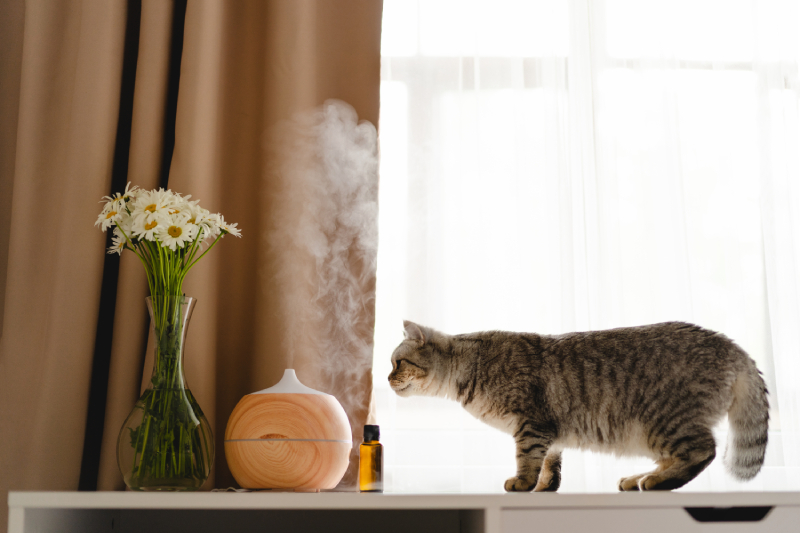Essential oils have gained popularity for their soothing and therapeutic benefits, but they may not be as safe for pets as they are for humans. While some essential oils can be used cautiously around pets, others pose serious health risks. March is Pet Poison Prevention Month, making it the perfect time to discuss the potential dangers of essential oils for pets and how to use them safely. At North Powers Animal Hospital, we want to help pet owners make informed decisions to keep their companions safe.
Common Essential Oils That Are Toxic to Pets
Certain essential oils can be highly toxic to either dogs, cats, or both species, even in small amounts. Exposure can occur through ingestion, inhalation, or skin absorption. The most common dangerous essential oils include:
- Tea Tree Oil
- Eucalyptus Oil
- Lavender Oil
- Cinnamon and Clove Oils
- Citrus Oils (Lemon, Orange, Grapefruit, Bergamot)
- Wintergreen and Peppermint Oils
- Pennyroyal Oil
- Ylang Ylang Oil
If you are curious about what plants are toxic to cats and dogs (which many essential oils are made from), check the ASCPA’s guide to toxic and non-toxic plants, which can be broken down by species.
Safe Uses of Essential Oils Around Pets
If you want to enjoy essential oils while keeping your pets safe, follow these guidelines:
- Use Pet-Safe Oils in Moderation: Some essential oils may be tolerated in very diluted amounts, but always consult a veterinarian first.
- Never Apply Essential Oils Directly to Your Pet: Pets can lick the oil from their fur, leading to ingestion and potential toxicity
- Avoid Using Oil Diffusers in Your Home: Pets have sensitive respiratory systems, and diffused oils can cause breathing issues.
- Store Essential Oils Securely: Keep oils out of reach of pets to prevent accidental spills or ingestion.
- Monitor Your Pet’s Behavior: If your pet shows signs of discomfort, such as excessive drooling, sneezing, or lethargy, remove the source immediately and seek veterinary advice.
How to Respond If Your Pet is Exposed to Toxic Essential Oils
If you suspect your pet has been exposed to a toxic essential oil, remove your pet from the area where they were exposed. Do not induce vomiting unless a veterinary professional instructs you to do so. Contact your veterinarian for emergency pet care or a poison control hotline immediately. Be prepared to tell the professional that you are speaking with what toxin your pet was exposed to, for how long, and (if swallowed) how much they ingested.
Keep Your Pet Safe from Essential Oil Toxicity with North Powers Animal Hospital
While essential oils offer many benefits for humans, they can pose serious risks to pets. Understanding which oils are toxic and how to use them safely can help protect your furry companions from accidental poisoning. March is Pet Poison Prevention Month, making now the perfect time to reassess how you use essential oils in your home. North Powers Animal Hospital wants to help you keep your pet safe from toxic substances all year round.
Have questions about essential oils safety or concerned that your pet has swallowed a toxic substance in Colorado Springs? Contact us today for expert guidance and toxic substance care.


